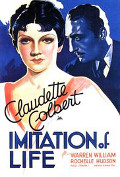
Directed by
John M. Stahl
111 minutes
Rated G
Reviewed by
Bernard Hemingway

Imitation Of Life (1934)
Although the Douglas Sirk’s 1958 remake is the better-known version, John M. Stahl’s adaptation of Fannie Hurst's 1933 novel is nevertheless a substantial effort and one of the first Hollywood films to address racism in American society as well as an early example of a genre that would become popular in the next decade with films like Mildred Pierce (1945) - the successful career woman.The film tells the story of the relationship between two struggling single mothers, Beatrice Pullman (Claudette Colbert) and Delilah Johnson (Louise Beavers) and their daughters. Beatrice opens a little pancake shop that thanks to Delilah’s secret recipe becomes a success. One day Bea gives a free serve of pancakes to an itinerant (Ned Sparks) who suggest she should "box it" and the result is “Aunt Delilah’s Pancake Company” (a name inspired by the real-life success of the Aunt Jemima pancake company). Everything is sweet except for Peola (Fredi Washington), Delilah’s light skinned daughter who hates her mother’s “Mammie” character.
Whilst the Delilah-Peola relationship is the main dramatic axis of the film, today most audiences will be looking at the film’s attitude towards race relations. Here it is of interest that Bea gives Delilah a twenty percent share in her business, something which perhaps was regarded as fair in its day but looks anything but now and to some extent sits at odds with Colbert’s portrayal of the sweet and kind Bea. That said, Delilah is a maddeningly subservient and obtuse individual who sees her lot as a reflection of the God-given order rather than something socially-constructed. The caricatural likeness that becomes the business’s image is another element that is also presented straight-facedly whilst the upstairs/downstairs living arrangements also literally structure the women’s social position. It is easy to fault the film for its ideological limitations however to even depict its subject matter was no doubt for its day a bold move.
The performances by Colbert and Beavers are effective although Warren William’s urbane ichthyologist is a familiar stereotype and the actor looks more 57 than his supposed 37. The film is of course an unrestrained weepie and works just as well today as it did then – if anything more so than the later version which made less of Bea’s sacrifice for her daughter
Want something different?





